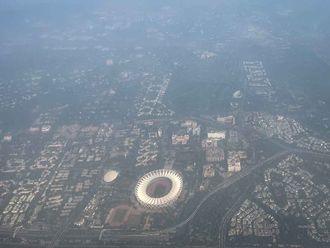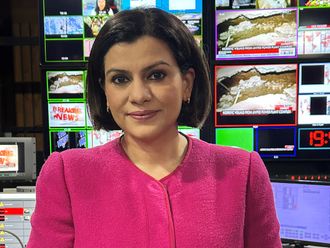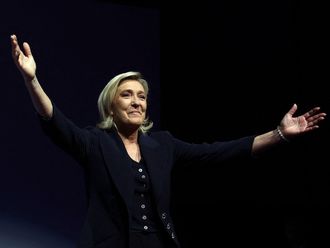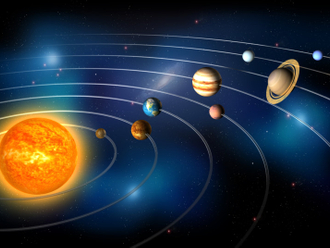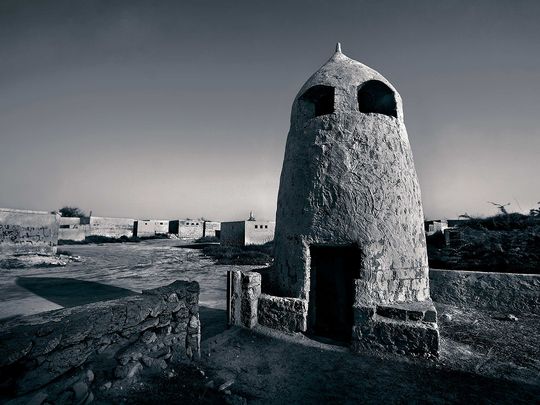
A week ago, His Highness Sheikh Dr Sultan bin Mohamad Al Qasimi, Supreme Council Member and Ruler of Sharjah, wrote about the history of Zaabi tripe, and where they lived in Jazeera Al Hamra, in Ras Al Khaimah. The name means the Red Island. A history lesson prevailed by Dr Sultan showing us how The Royal Navy of the British Empire was deceived 200 years ago by village people.
He explains, “On the 16th of January 1820, Thomas, a lieutenant and field engineer, was assigned to go to the Red Island on the East India Company’s warship Sigma W/T, which arrived at Jazeera Al Hamra on the same day.
Soldiers were disembarked on the island from the north and south sides, and the soldiers dug trenches. When the commander announced the attack on the town, the soldiers entered it from both sides, and made their way through the narrow roads.
Stray dogs ran through those roads and met the soldiers, who shot them and they fled to the other side, and the soldiers there shot them as well. Each side of the soldiers thought that there was resistance in the city, and they continued until they met face to face. It became clear to them that the city was empty of people, all it had were empty walls and stray dogs.
The Royal Navy ships, carrying gigantic cannons, all lined up facing the little island. The fully geared up British soldiers are ready for another war. The Empire mobilised all this force to demolish village houses built of clay and palm tree branches.
Perhaps the majority of the people of Jazeera could not imagine how a forgotten village with few hundred fishermen people could pose a threat to the interests of the British Empire? It seemed strange!
But the village people with their survival instincts, as mentioned by Sheikh Sultan, knew that the British did not come with their fleets and forces to negotiate, but to eliminate any possibility for small nations to talk about their basic human rights. How dare they challenge the empire on which the sun never sets.
Where the sand ends and the sea begins
As a person born and raised and Jazeera Al Hamra, I can tell you how we lived when UAE was only few years old. The borders of our island were our world’s borders as well. From “Al Qurmah” south to “Abu Hammad” north, farthest corners of Jazeera was where the sand ends and the sea begins.
At the entrance to the Jazeera was an abandoned police station called “Al Markaz Al Jadeem” meaning Old Station. After less than a kilometre, you reach a small bridge that takes you to our island.
There were two seas, the Big Sea and the Small Sea. The Small Sea was a shallow creek with many coral reefs and the Small Sea had other types of sharp shells called locally “Bu Suwailih”. We didn’t eat them but Europeans would come and collect as much Bu Suwailih as they could to eat what was inside it. Apparently it is a type of oyster. It was a little culture shock for us.
Between the two seas there is an area called Dhahr, with soft sand, extremely hot during the day and cool to walk in at night. Your ankles literally would sink into the soft sands.
In Dhahr, many types of fish were hung to dry in the sun, in addition to shark fins of all kinds. Once, while we were playing on the back, a European man came towards us and looked at dozens of dried “Sayyaf swords,” a type of shark, the front part of which looks like a saw.
He tried to communicate with us kids and started babbling while we were in complete loss. After a few seconds, the blond visitor realised that there was no way to communicate with us linguistically. Perhaps he wanted to know the price of “Sayyaf swords” so he could buy them.
So the visitor went and brought us “2 bottles of Miranda” from the small ice box he had with him. As kids our eyes were fixed on the dripping cold bottles with glowing orange colour in the sun. The deal was done. The man took the Sayyaf sword and we shared the Miranda bottles among ourselves. Nobody knows till now.
In Jazeera there was no pharmacy, no bakery, no photographer, no laundry, no hotel or cinema. Al-Nisr sports Club was the haven for the youth of Jazeera. I remember the families, men and women, attending the games and cheering, standing all the time because stands for fans didn’t exist. All kids who grew up in the early seventies in Jazeera can remember the time when there was no electricity nor running water.
Today, UAE people, in their fifties and sixties, talk to the youth about the past, as they walk into the Louvre Museum in Saadiyat, or when they shop in Dubai Mall, or participate in a symposium on artificial intelligence at the University of Sharjah, or have dinner on top of Jebel Jais in Ras Al Khaimah.
In these moments, we need to stop and remind ourselves and our youth how their fathers and grandfathers lived, so they truly know the value of what they have today.
Ali Al Ahmad is the assistant under-secretary for policies in the UAE ministry of defence. He previously served as UAE ambassador to Germany and France.


